Your Newborn at Home: Care Instructions
During your baby's first few weeks, you may feel overwhelmed at times. Newborn care gets easier with every day. Soon you will know what each cry means, and you'll be able to figure out what your baby needs and wants.
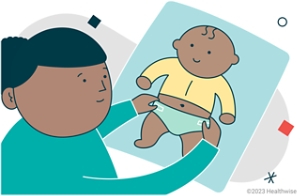
To keep the umbilical cord uncovered, fold the diaper below the cord. Or you can use special diapers for newborns that have a cutout for the cord.
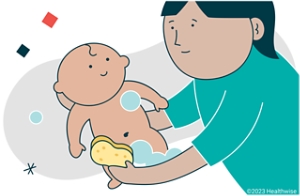
You can give your baby a full bath before the cord falls off. After the bath, fully dry the cord with a cotton-tipped applicator or the tip of a clean cloth. The cord should fall off in about 1 to 3 weeks after birth.
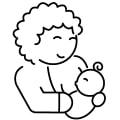
Feeding your baby
- Feed your baby whenever they're hungry. Feedings may be short at first but will get longer.
- Newborn babies need to feed frequently, both day and night, in the beginning. Follow your baby’s feeding cues for hunger and fullness.
- Babies will need to feed at least 5 times in the first 24 hours after they’re born.
- At 24 to 48 hours old, babies who breastfeed will feed at least 8 times in 24 hours and may have 1 or 2 long periods of cluster feeding. At 24 to 48 hours old, babies who formula feed will feed about 6 to 8 times in 24 hours, with no set schedule.
- Learn how to tell if your baby is getting enough breastmilk or if they're getting enough infant formula, and when to call for help.
- Wake your baby to feed, if you need to.
- Call Health Link at 811 or your healthcare provider now if your baby will not wake up on their own to feed, is always sleepy, will not feed, or is not showing feeding cues.
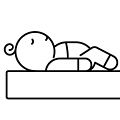
Understanding your baby's sleeping
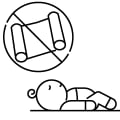
Keeping your baby safe while they sleep
- Always put your baby on their back to sleep, for every sleep.
- Use a crib, cradle, or bassinet that meets Canadian safety standards.
- Keep your baby’s crib, cradle, or bassinet free of clutter.
- Keep your baby warm, not hot.
- Keep spaces smoke-free.
- Share a room with your baby. Have your baby sleep in the same room as you for at least the first 6 months.
- Don't sleep with your baby. Do not share a bed, sofa, or any other sleep surface with your baby.
- Don't place your baby in a car seat, sling, swing, bouncer, or stroller to sleep.
- Learn more about safe sleep for your baby.
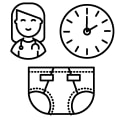
Changing your baby's diapers
- Check your baby's diaper (and change if needed) at least every 2 hours.
- You can tell if your baby is getting enough breastmilk or formula by the number of wet (urine) and dirty (stool or bowel movement) diapers they have.
- Expect your newborn baby to have at least 1 small, wet diaper and at least 1 meconium stool in the first 24 hours after they’re born. Meconium stool is greenish-black, sticky stool.
- The number of wet and dirty diapers your baby has every 24 hours should increase over the first few days. By 6 to 7 days and older, expect your baby to have at least 6 large, heavy wet diapers every day.
- Keep track of your baby's wet diapers and stools. Let your doctor, public health nurse, or midwife know of any changes. Call Health Link at 811 or talk with your healthcare provider if your baby isn’t having the expected number of wet diapers or stools every 24 hours.
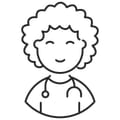
Keeping your baby healthy
- Ask your baby's doctor or midwife about vitamin K. All newborns should receive vitamin K in the first 6 hours after birth to lower the risk of severe bleeding. Learn more about vitamin K for newborns.
- Take your baby for any tests your doctor, public health nurse, or midwife recommends. For example, babies may need follow-up tests for jaundice before their first doctor visit.
- Go to your baby's first doctor visit. First doctor visits are usually within a week after childbirth.
- Call Health Link at 811 or your nearest public health or community health centre to book an appointment for your baby’s 2-month routine immunizations.

Registering your baby’s birth
- All births that happen in Alberta need to be registered by the baby’s parents with the Alberta government.
- To register your baby’s birth, visit alberta.ca/birthregistry
- You cannot get a birth certificate for your baby until you register the birth.
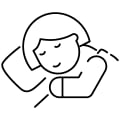
Caring for yourself
- Trust yourself. If something doesn't feel right with your body, tell your doctor, public health nurse, or midwife right away.
- Sleep when your baby sleeps, eat regular meals, drink plenty of water, and ask for help if you need it.
- Tell your doctor, public health nurse, or midwife if you or your partner feels sad or anxious for more than 2 weeks.
- Call your doctor, public health nurse, or midwife with questions about breastfeeding or bottle-feeding.
- Learn more about caring for yourself during your first few weeks at home with a new baby.
Follow-up care is a key part of your child's treatment and safety. Be sure to make and go to all appointments, and call your doctor or nurse advice line (811 in most provinces and territories) if your child is having problems. It's also a good idea to know your child's test results and keep a list of the medicines your child takes.
Where can you learn more?
Go to https://www.healthwise.net/patientEd
Enter G069 in the search box to learn more about "Your Newborn at Home: Care Instructions".
Adaptation Date: 09/19/2025
Adapted By: Alberta Health Services
Adaptation Reviewed By: Alberta Health Services
